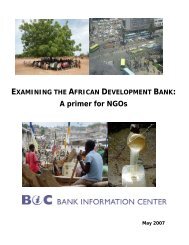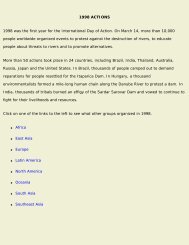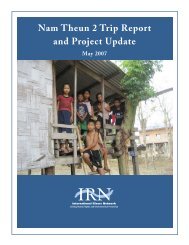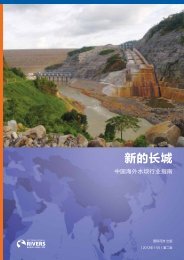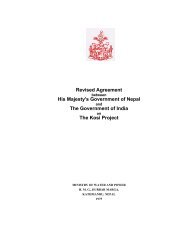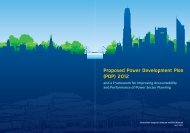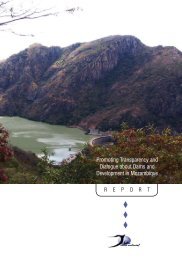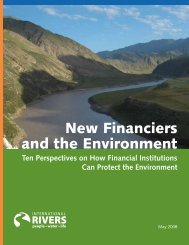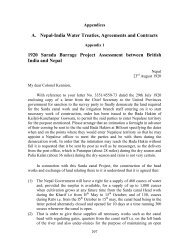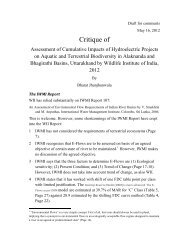Mountains of Concrete - International Rivers
Mountains of Concrete - International Rivers
Mountains of Concrete - International Rivers
You also want an ePaper? Increase the reach of your titles
YUMPU automatically turns print PDFs into web optimized ePapers that Google loves.
Box 3: Merchant Sale <strong>of</strong> Power and WindfallPr<strong>of</strong>its for Private companiesIndia’s new Hydropower Policy allows developers to sell40% <strong>of</strong> their saleable electricity on a merchant basis.In the case <strong>of</strong> hydropower projects, the main component<strong>of</strong> production costs is financial – repayment <strong>of</strong> capital,principle and interest. (The social and environmentalcosts are <strong>of</strong>ten externalized, and thus not paid for by theprojects themselves).After 7-10 years, when full repayment <strong>of</strong> capital costs iscomplete, the cost <strong>of</strong> generating power can fall sharply.However, in the open market, electricity can fetch avery high price. Thus, allowing a private company to sellpower in the open market can lead to windfall pr<strong>of</strong>its.As an example, consider the 300 MW Baspa-II Project.According to the Tariff Order by the Himachal PradeshState Electricity Regulatory Commission, in 2006, ifcompany pr<strong>of</strong>its are left out, 89% <strong>of</strong> the generationcost went to capital recovery and 11% to operatingexpenses. Thus, as soon as repayment is complete, thecost <strong>of</strong> generation will drastically decrease by 89%. Thecompany will be paying just 11% <strong>of</strong> the previous costs<strong>of</strong> production, but the price <strong>of</strong> electricity on the marketwill remain the same. Thus, the company stands to makesudden, huge pr<strong>of</strong>its.In the case <strong>of</strong> a public company, when the cost <strong>of</strong> generationgoes down in later years, the result is a decreasein the pooled cost <strong>of</strong> electricity generation; it can thensell the power at lower tariffs. The benefit will go to thepublic at large. But in the case <strong>of</strong> a private developer,this benefit goes directly to shareholders.consumer, and mediated by the rules set by the regulatorycommissions, other agencies are also likely to play a key role.One such agency is PTC India Limited (formerly PowerTrading Corporation <strong>of</strong> India).PTC India Limited was set up for trading powerand encouraging the development <strong>of</strong> a power market. Animportant role that PTC has been asked to play by thegovernment <strong>of</strong> India is that <strong>of</strong> the nodal agency for tradingpower with the neighboring countries <strong>of</strong> Bhutan andNepal. Among the projects whose electricity is being or willbe traded by PTC are Malana-II and Karcham Wangtoo inIndia, West Seti in Nepal, and Chukha, Kurichu and Talain Bhutan. Several other trading companies are also in theprocess <strong>of</strong> being created.Another important development in this context is thelaunch <strong>of</strong> the Indian Energy Exchange Limited (IEX), onJune 27, 2008. The IEX “…is India’s first-ever, nationwide,automated, and online electricity trading platform. It hasbeen conceived to catalyse the modernisation <strong>of</strong> electricitytrade in the country by ushering in a transparent and neutralmarket through a technology-enabled electronic tradingplatform.” 76M o u n ta i n s o f C o n c r e t e : D a m B u i l d i n g i n t h e H i m a l aya s | 1 9



